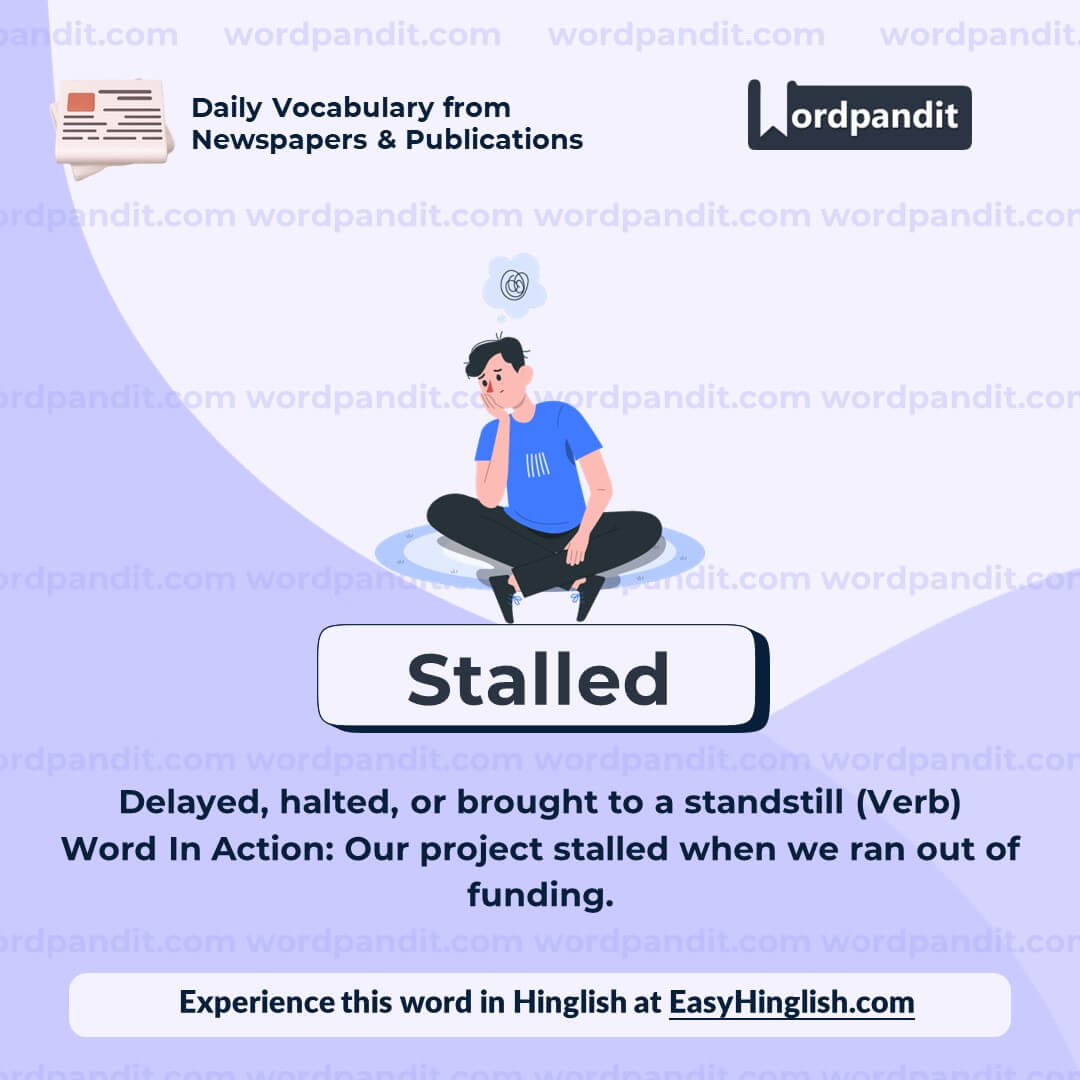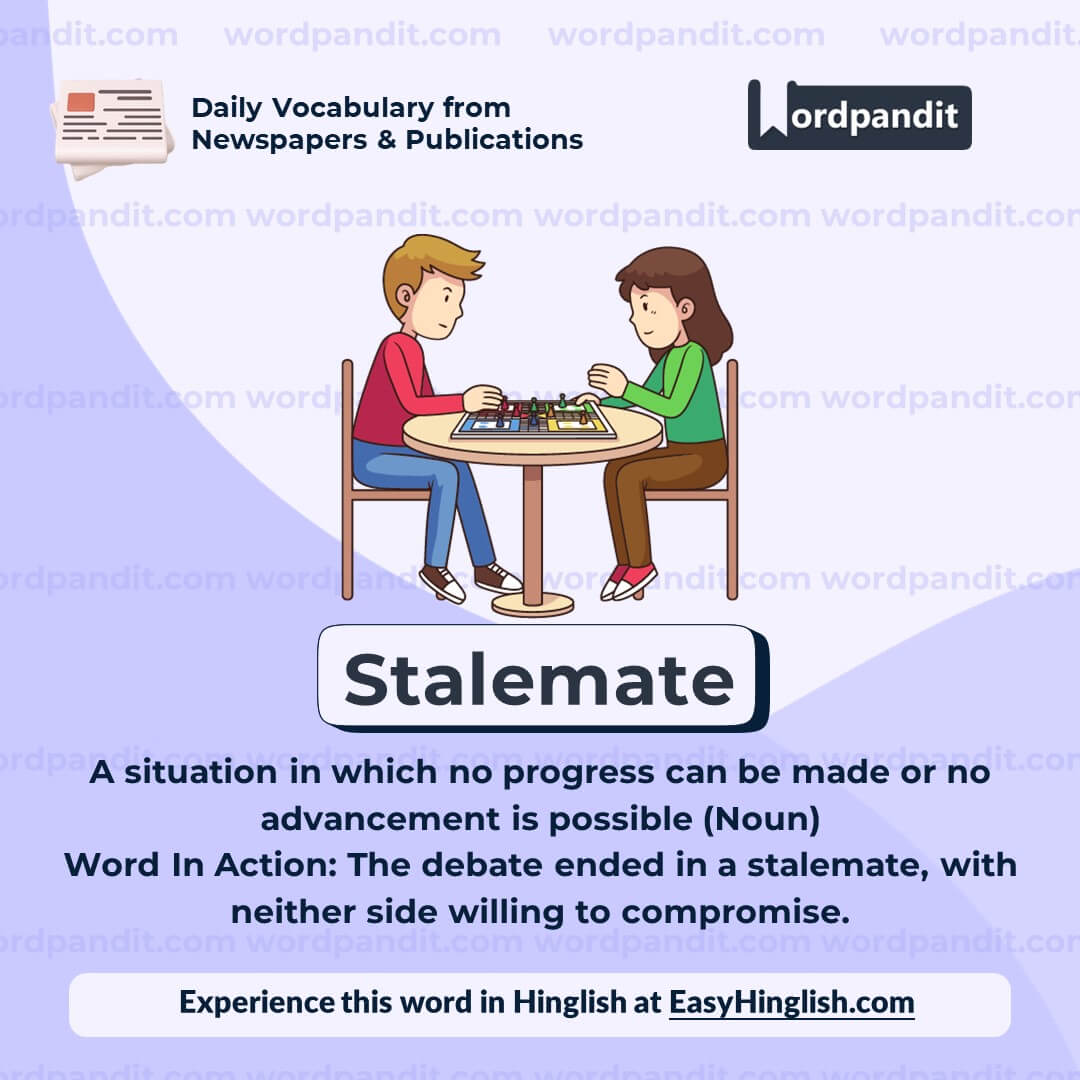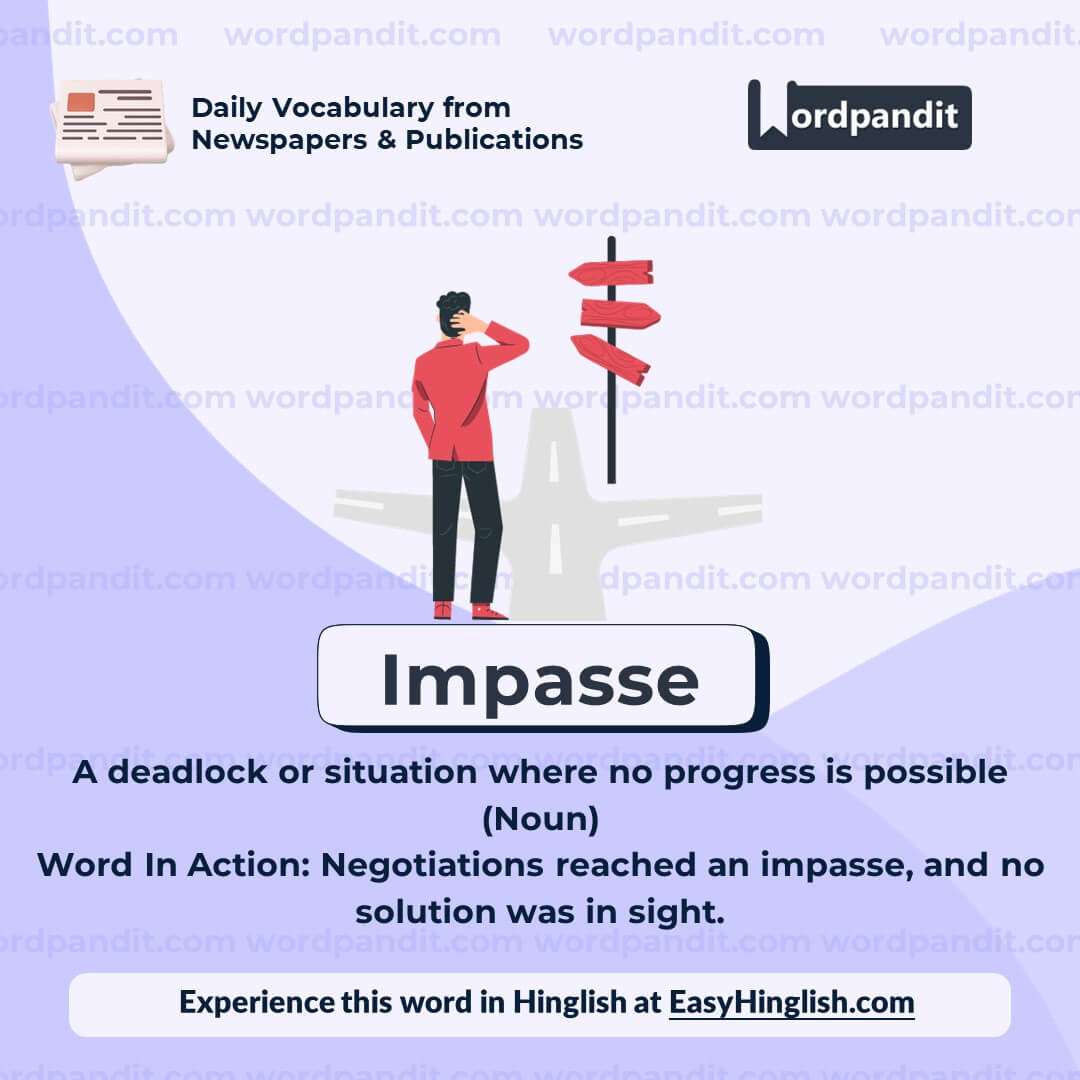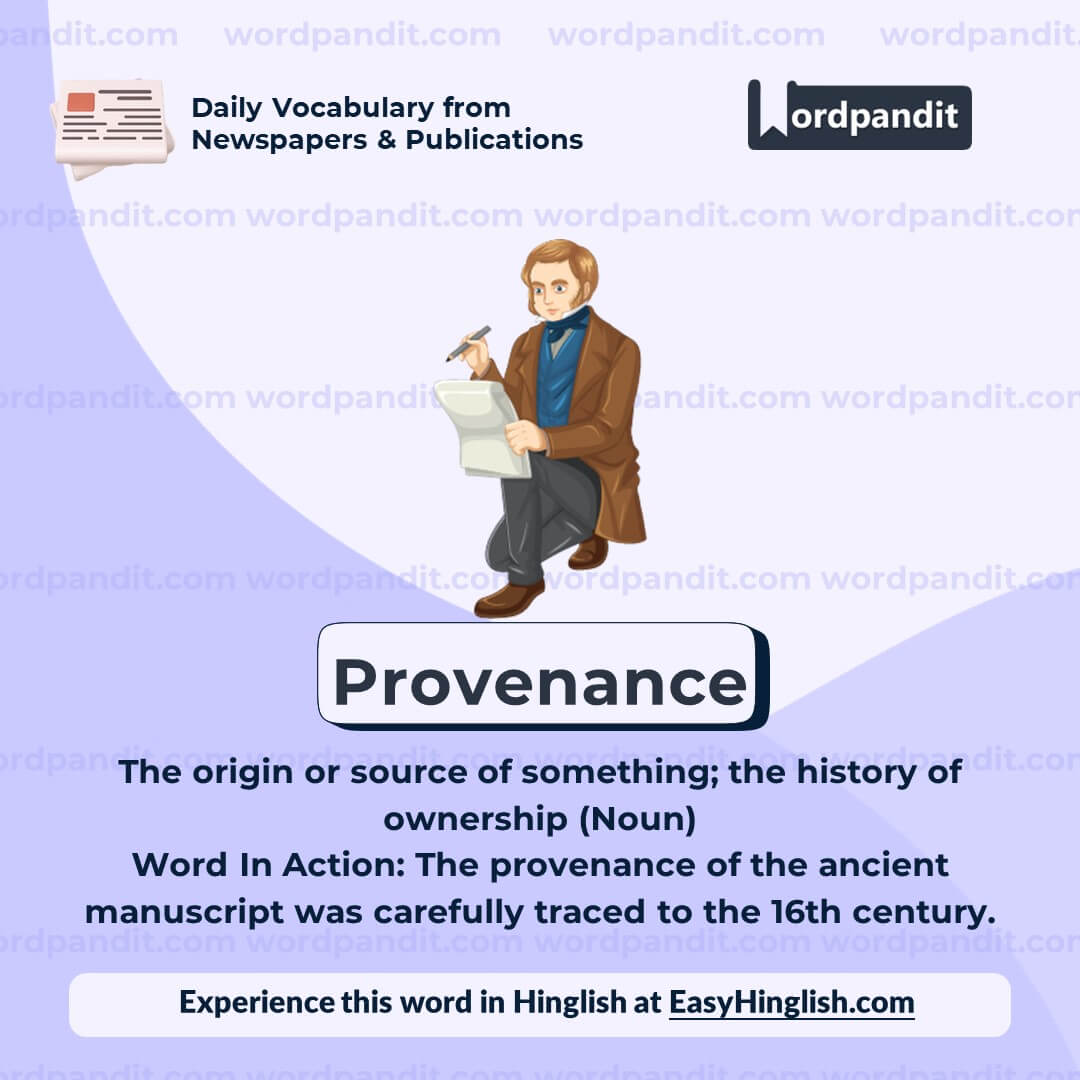Daily Vocabulary from Indian Newspapers and Publications
Welcome to Wordpandit’s Indian Vocabulary Hub
At Wordpandit, we understand the importance of staying rooted in the local context while expanding your language skills. This section focuses on enriching your vocabulary with words and phrases drawn from India’s leading newspapers and publications, ensuring you're learning vocabulary that is practical, relevant, and uniquely Indian.
Why Indian Sources Matter
We believe that the best way to master any language is by immersing yourself in local content. That’s why we carefully curate vocabulary from top Indian publications, including:
- The Hindu
- The Times of India
- The Economic Times
- Hindustan Times
- Live Mint
- The Indian Express
- And many others...
Stay Updated, Stay Relevant
With daily updates from Indian news sources, you’ll be consistently learning words that reflect the trends and shifts in Indian society and culture. Our focus is to provide vocabulary that enhances your understanding of the language in an Indian context.
How Wordpandit Supports Your Goals
Whether you’re preparing for exams, aiming to improve your professional communication, or simply want to stay connected with the latest Indian vocabulary, Wordpandit is here to guide you every step of the way.
Learn with a Practical Approach
Our interactive learning methodology includes real-world examples, engaging activities, and context-specific usage to ensure that every word becomes part of your active vocabulary.
Dive into Indian Vocabulary Today!
Why Choose Wordpandit?
Practical Learning: Focus on words you'll actually encounter in real-world reading, enhancing your comprehension and communication skills.
Diverse Content: From current affairs to scientific breakthroughs, our varied sources expose you to vocabulary across multiple domains.
Effortless Integration: Make Wordpandit a part of your daily routine. Just a few minutes each day can significantly boost your lexicon over time.
Your Path to Vocabulary Mastery
- Visit our Daily Vocabulary section regularly
- Explore new words and their usage in context
- Practice incorporating these words into your own writing and speech
- Track your progress as your vocabulary expands
Start Your Journey Today
Embark on your vocabulary enhancement journey with Wordpandit. By consistently engaging with our daily posts, you'll build a robust vocabulary that serves you well in academic, professional, and personal contexts.
Remember, a word a day keeps linguistic limitations at bay. Make Wordpandit your daily companion in the quest for vocabulary excellence!
WORD-1: Stalled
Context:
"Governance in Delhi suffered for the last decade because of the Bharatiya Janta Party led Union government had ensured that all decisions of the state government were stalled using the office of the lieutenant governor (LG)." - The Wire
Explanatory Paragraph:
The word "stalled" refers to something that has been delayed, stopped, or brought to a standstill, often due to external factors. It is commonly used in political, economic, or mechanical contexts where progress is obstructed or interrupted. In the given context, it implies that decisions made by the Delhi government were deliberately hindered, preventing effective governance.
Meaning: Delayed, halted, or brought to a standstill (Verb)
Pronunciation: Stawld
Difficulty Level: ⭐⭐ (Easy to Intermediate)
Etymology: Derived from Old English "steall" meaning "place" or "stand," later evolving to mean "bring to a stop" in Middle English.
Synonyms & Antonyms:
Synonyms: Halted, obstructed, delayed, stopped, hindered
Antonyms: Progressed, advanced, continued, moved forward
Usage Examples:
- The construction of the bridge was stalled due to financial constraints.
- Negotiations between the two countries stalled after a major disagreement.
- His career stalled when he refused to accept new challenges.
- The car stalled in the middle of the road, causing a traffic jam.
Cultural Reference:
"Economic reforms in many countries often get stalled due to political instability and resistance from opposition parties." - A common theme in global economic discussions.
Think About It:
Can you think of a time when a stalled decision or project affected your personal or professional life?
Quick Activity:
Use "stalled" in a sentence related to technology or business.
Memory Tip:
Think of a car "stalling" in traffic—it's stuck and can't move forward, just like any process that is stalled.
Real-World Application:
Understanding the word "stalled" is useful in business, politics, and daily conversations, especially when discussing delays in projects, decisions, or policies.
WORD-2: Stalemate
Context:
"Ten years of stalemate in the governance of the state led a section of the AAP voters to conclude that it was only prudent to seek refuge in Gabbar." - The Wire
Explanatory Paragraph:
"Stalemate" refers to a situation where no progress can be made due to opposing forces or an impasse. Originally a chess term describing a game where neither player can make a legal move to win, it is now commonly used in political, business, and negotiation contexts to indicate deadlock or lack of resolution. In the given context, "stalemate" suggests that governance in the state had been stuck for a decade, leading some voters to lose faith in the ruling party.
Meaning: A situation in which no progress can be made or no advancement is possible (Noun)
Pronunciation: Stayl-mayt
Difficulty Level: ⭐⭐⭐ (Intermediate)
Etymology: Derived from the Old French "estal" (position or place) and Middle English "mate" (from chess, meaning "checkmate"), originally used in chess before being applied metaphorically to other situations.
Synonyms & Antonyms:
Synonyms: Deadlock, impasse, gridlock, standstill
Antonyms: Breakthrough, resolution, progress, advancement
Usage Examples:
- The peace talks ended in a stalemate, with neither side willing to compromise.
- After months of negotiation, the contract dispute reached a stalemate.
- The chess game resulted in a stalemate, leaving both players frustrated.
- The political debate turned into a stalemate as both parties refused to budge from their positions.
Cultural Reference:
"The Cold War between the USA and USSR was often described as a global stalemate, with neither side able to achieve complete dominance." - A key theme in 20th-century geopolitics.
Think About It:
Can you think of a real-life situation where a stalemate prevented progress, either in politics, business, or personal relationships?
Quick Activity:
Write a short paragraph describing a situation in which two opposing sides are locked in a stalemate.
Memory Tip:
Think of a chess game where neither player can make a winning move—just like a stalled situation in real life!
Real-World Application:
The concept of "stalemate" is widely used in political debates, international relations, and workplace negotiations to describe deadlocks that require creative solutions.
WORD-3: Coerced
Context:
"They will tell you that the voters have been coerced out of the voters as they see this as the only way out of the impasse." - The Wire
Explanatory Paragraph:
The word "coerced" refers to forcing someone to act in a certain way through pressure, threats, or intimidation. It implies a lack of free will, where the person or group is compelled to act against their wishes. In the given context, "coerced" suggests that voters were pressured or forced into making a particular choice, possibly due to fear or manipulation.
Meaning: Forced or pressured into doing something against one's will (Verb)
Pronunciation: Koh-urst
Difficulty Level: ⭐⭐⭐ (Intermediate)
Etymology: From Latin "coercere," meaning "to restrain, confine, or control," derived from "com-" (together) and "arcere" (to enclose, confine).
Synonyms & Antonyms:
Synonyms: Forced, compelled, intimidated, pressured
Antonyms: Persuaded, convinced, encouraged, volunteered
Usage Examples:
- The witness claimed he was coerced into giving false testimony.
- Many workers felt coerced into signing the unfair contract.
- She was coerced into keeping silent about the corruption scandal.
- The dictator's regime was accused of using coerced confessions in trials.
Cultural Reference:
"Coerced confessions have been a common theme in dystopian literature, such as in George Orwell's 1984, where the government forces individuals to conform through intimidation and surveillance."
Think About It:
Can you think of a situation in history or current events where people were coerced into making decisions?
Quick Activity:
Write a sentence using "coerced" in a legal or political context.
Memory Tip:
Think of "coerced" as "forced"—they sound similar and both involve pressure and lack of free will.
Real-World Application:
The concept of coercion is important in legal and ethical discussions, particularly in cases of forced confessions, workplace harassment, and political manipulation.
WORD-4: Impasse
Context:
"They will tell you that the voters have been coerced out of the voters as they see this as the only way out of the impasse." - The Wire
Explanatory Paragraph:
The word "impasse" refers to a situation in which no progress can be made due to a deadlock or stalemate. It often occurs when two or more opposing sides cannot reach an agreement, leading to stagnation. In the given context, "impasse" suggests that the political situation had reached a standstill, forcing voters to seek alternative solutions.
Meaning: A deadlock or situation where no progress is possible (Noun)
Pronunciation: Im-pass
Difficulty Level: ⭐⭐⭐ (Intermediate)
Etymology: From French "impasse," meaning "a dead-end street," composed of "in-" (not) and "passer" (to pass), indicating a blocked path.
Synonyms & Antonyms:
Synonyms: Deadlock, stalemate, standstill, gridlock
Antonyms: Breakthrough, resolution, progress, agreement
Usage Examples:
- The negotiations between the two countries reached an impasse over trade tariffs.
- The budget talks ended in an impasse, delaying government operations.
- The couple's disagreement over finances led to an impasse in their relationship.
- Without a compromise, the labor strike will remain at an impasse.
Cultural Reference:
"The Cuban Missile Crisis of 1962 was a major geopolitical impasse, with the U.S. and the Soviet Union on the brink of nuclear war before a last-minute resolution was reached."
Think About It:
Can you recall a time when a personal or professional disagreement reached an impasse? How was it resolved?
Quick Activity:
Write a sentence using "impasse" in a business or diplomatic context.
Memory Tip:
Think of "impasse" as "I'm-passed"—a blocked road where you can't move forward.
Real-World Application:
Understanding "impasse" is crucial for discussing political negotiations, workplace disputes, and global conflicts where progress is stalled due to opposing positions.
WORD-5: Provenance
Context:
"In AAP's provenance lies the reason for its defeat." - The Wire
Explanatory Paragraph:
"Provenance" refers to the origin, source, or history of something, particularly in relation to its authenticity or development. It is commonly used in discussions about art, historical artifacts, and ideas, but can also apply to political or ideological backgrounds. In the given context, "provenance" suggests that the origins or past actions of the Aam Aadmi Party (AAP) played a crucial role in its defeat.
Meaning: The origin or source of something; the history of ownership (Noun)
Pronunciation: Prov-uh-nuhns
Difficulty Level: ⭐⭐⭐ (Intermediate)
Etymology: From French "provenance," meaning "origin," derived from Latin "provenire" ("to come forth" or "arise").
Synonyms & Antonyms:
Synonyms: Origin, source, history, pedigree, background
Antonyms: Consequence, result, effect
Usage Examples:
- The museum verified the painting’s provenance before purchasing it.
- The provenance of this ancient manuscript traces back to the 12th century.
- Before investing in the startup, he carefully examined its financial provenance.
- Critics argue that the party’s political provenance influenced its policy decisions.
Cultural Reference:
"In the art world, provenance is crucial in determining the authenticity and value of a painting. Famous cases, such as the discovery of lost Van Gogh paintings, highlight the importance of tracing an artwork’s history."
Think About It:
Why do you think provenance is important in fields like history, law, and politics? Can you think of an example where tracing something's origin changed its perception?
Quick Activity:
Write a sentence using "provenance" in the context of history or politics.
Memory Tip:
Think of "provenance" as "proving origins"—it helps verify where something came from.
Real-World Application:
Understanding provenance is essential in law, history, art, and journalism. Whether verifying the authenticity of documents or understanding political movements, knowing the origins of something can provide valuable insights.



















